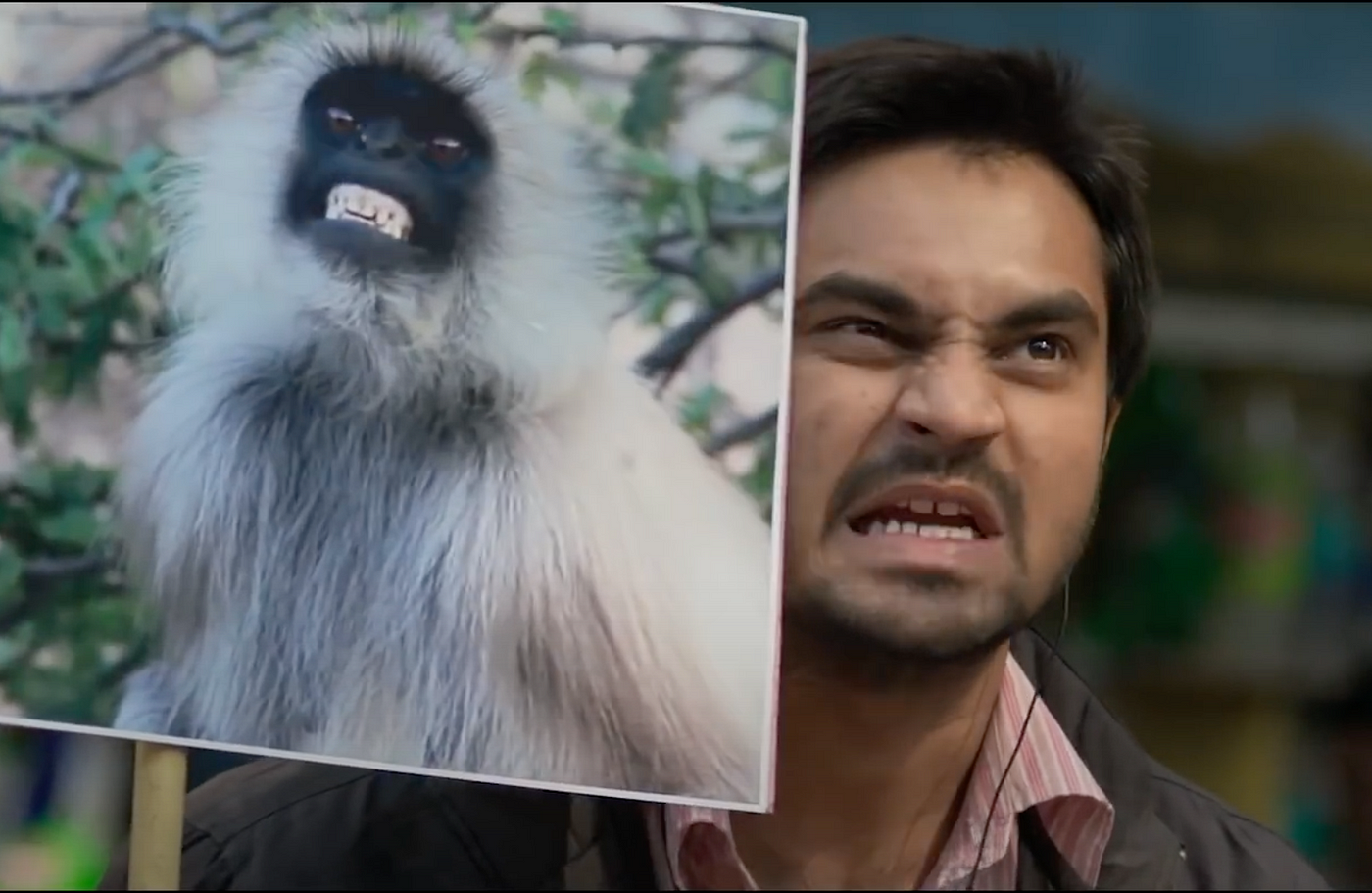
There is a point in Eeb Allay Ooo! when Anjani Kumar’s (probably) girlfriend reaches the limits of her patience with his demands of an ideal job. He is not qualified for even a low-rung desk job and yet he refuses to make peace with his job as a professional monkey-controller.
Briefly, even I scold him for having outsize dreams despite having done nothing to bring himself closer to the appropriate levels of qualifications.
But, the very next instant I question my ruffled feathers — why was I denying this man even the chance to imagine something better? And had he not been trying to make peace over and over again?
That is when I understood the film and saw Anjani clearly.

In many parts of India, and it would also certainly be true of the rest of the developing world, malls are built right across hovels, and luxury watch ads can be seen from the windows of overcrowded public buses. Desires are sold to us in bulk, and in similar bulk are they denied to us.
I, myself, am no greatly qualified person, but I occasionally dream of fabulous foreign holidays. An MBA, who may work for a company providing no real benefit to society, still demands and receives pay packages which would knock a small village senseless.
Some of us are encouraged to dream. Some are not.
But dreams are cruel and come uninvited, even into Anjani’s head.

His sister and brother-in-law, disciplined migrants without any great expectations from their station in life, advise him to be like them. And yet, even after making compromises willingly, they are made to submit to further demands just to get their very basic dues. Can compromise even be finalised, or it is a lifelong process? And somehow those with the humblest footprints in society are often the ones from whom we make the greatest demands (remember the great migrant march of 2020, during Covid?).
So it would appear a life of compromise does not guarantee stability or respect. It does not usher in happiness. In fact, have we not often seen that the most demanding individuals, those with towering egos and infinitely small conscience, are often given the most respect?

Anjani’s mentor, Mahendra, is extremely good at his job and even his bosses are happy with him. He is the one person who is always willing to give Anjani the chance to improve himself without criticising him. There is something unreal about a work colleague, a senior in fact, who is so compassionate and paternal, and perhaps he has been glorified just to make his fate hurt more.
He gets lynched during the course of his job by those who would rather protect a monkey god, than actual humans or monkeys (well, humans are monkeys). Collective fever-dreams, aka mythology, is sacred, but an individual’s dreams are trash. This was a man who fulfilled a valuable role in society, who brought real skills to his work, and yet his destiny was written by a cruel hand. Something similar could happen to Anjani’s sister or brother-in-law when they are forced to keep a work-rifle at home. We are always afraid some terrible accident is about to take place. And yet this is a perfectly acceptable demand made by the employers. Would we be similarly agreeable to keeping a gun at home if our employers set that as part of salary negotiations?
So what does it even mean for someone in their place to make smart choices?
In Satyajit Ray’s 1976 film Jana Aranya, Somnath is a young man in search of a job who is forced to make drastic moral choices once he decides to get into business for himself. Arbitrary twists of fate deny him his due exam results, which in turn deny him jobs, and lead him to bribery and even soliciting prostitutes; where he has been forced on to a path and from where he cannot see any turn that will set him free from this cycle; can this man free himself and will he be able to walk away from the compromises he is expected to make? And what of the prostitutes? They are also victims of a system where even an educated and professionally qualified individual has to turn to seedy work in order to make ends meet for themselves and their family.
The problem Anjani is expected to tackle, ridding central Delhi of wild monkeys and getting them relocated out of the city, is certainly absurd in itself. But what’s even more absurd is that while a powerless man like him is expected to solve this problem, many other powerful ones are abetting the same problem and getting in the way of him fulfilling his duty. It’s a trickle-down of shit that the higher-ups create and the lower-downs are expected to clean up.

Breaking out in an angry and psychotic dance at the end of the film is a tribute to this absurdity. Madness and frenzy are the only possible human responses to this situation. After every path is blocked, every idea is murdered, and every compromise has its back broken — after that what is Anjani left with?
Getting angry with Anjani may be natural, but so is his desire for a better, safer job. To dismiss his monumentally minute ambitions would be a mistake, and even a grave disservice to our idea of what a lucrative society we’ve been building.
Eeb Allay Ooo! (2019)
Directed by Prateek Vats
Screenplay by Shubham and Prateek Vats
Language: Hindi
Thanks for reading my essay! Your interest gives me enormous motivation to keep on writing. If you have any comments I’d love to read and respond to them. And if you want to read some of my other works then head over to www.amazon.in/Sumit-Ray/ where you can see some of my fiction writing, and also a book of essays on Satyajit Ray’s entire fiction filmography.
Leave a Reply